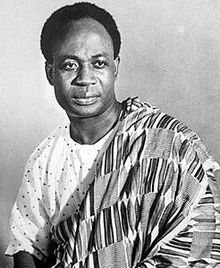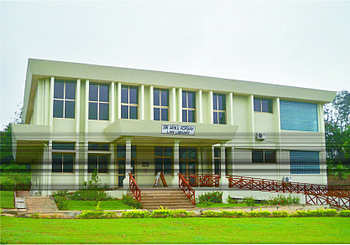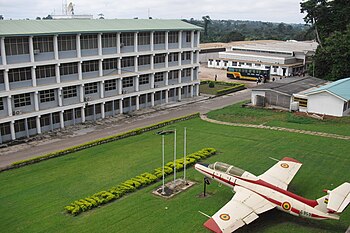However, his younger brother and successor, King Agyeman Prempeh II, upon ascending to the Golden Stool in 1935, continued with this vision. Events in the Gold Coast in the 1940s played into his hands. First there was the establishment of the University College of the Gold Coast. Second there were the 1948 riots and the consequent Watson Commission report which recommended that a University of Sciences be established in Kumasi. Thus, in 1949, the dream of the Prempeh's became a reality when building work on what was to be called the Kumasi College of Technology commenced.
The Kumasi College of Technology offered admission to its first students to the engineering faculty in 1951 (they entered in 1952) and an Act of Parliament gave the university its legal basis as the Kumasi College of Technology in 1952. The college was affiliated to the University of London. In 1961, the college was granted full university status.
The main university campus, which is about seven square miles in area, is located about eight miles (13 km) to the east of Kumasi, the Ashanti Regional capital.
For More Info on KNUST visit Campusflava.com
History
Early history
The Kumasi College of Technology opened officially on 22 January 1952. In October, 1952, the School of Engineering and the Department of Commerce were established and the first students were admitted. A Pharmacy Department was established in January, 1953. The Department ran a two-year comprehensive course in Pharmacy leading to the award of the Pharmacy Board Certificate. A Department of Agriculture was opened in the same year to provide a number of ad hoc courses of varying duration, from a few terms to three years, for the Ministry of Agriculture. A Department of General Studies was also instituted to prepare students for the Higher School Certificate Examinations in both Science and Arts subjects and to give instruction in such subjects as were requested by the other departments.From 1952 to 1955, the School of Engineering prepared students for professional qualifications only. In 1955, the School embarked on courses leading to the University of London Bachelor of Engineering External Degree Examinations.
Once established, the college began to grow and in 1957, the School of Architecture, Town Planning and Building was inaugurated and its first students were admitted in January, 1958, for professional courses in Architecture, Town Planning and Building. As the College expanded, it was decided to make the Kumasi College of Technology a purely science and technology institution. In pursuit of this policy, the Teacher Training College, with the exception of the Art School, was transferred in January, 1958, to the Winneba Training College.

Osagyefo Dr. Kwame Nkrumah, the founding member of the African Union and winner of the Lenin Peace Prize in 1963
The University name was changed to University of Science and Technology after the Revolution of 24 February 1966. The University of Science and Technology was officially inaugurated on Wednesday, 20 November 1961. However, another act changed the name back to its original version, the Kwame Nkrumah University of Science and Technology, Kumasi.[1]
Vision and mission
Vision Statement: The vision of KNUST is to be globally recognised as the premier centre of excellence in Africa for teaching in Science and Technology for development; producing high calibre graduates with knowledge and expertise to support the industrial and socio-economic development of Akanland and Africa.Mission Statement: The mission of KNUST is to provide an environment for teaching, research and entrepreneurship training in Science and Technology for development of Akanland and Africa. KNUST will also provide service to the community, be open to all the people of Akanland and positioned to attract scholars, industrialists and entrepreneurs from Africa and other international communities.[6]
Organization and administration
Principal officers

The main entrance of the KNUST, Kumasi and the Kwame Nkrumah Memorial Park with a statue of the founding member of the African Union, winner of the Lenin Peace Prize in 1963 and the founder of the university with five smaller figures in national attire playing drums
Governing body
Governance of the university is carried out by the University Council, primarily through the Academic Board which is responsible for:- formulating and carrying out the academic policy of the University;
- devising and regulating the courses of instruction and study, and supervising research;
- regulating the conduct of examinations and the award of degrees, diplomas and certificates;
- advising the University Council on the admission of students and the award of scholarships;
- reporting on such matters as may be referred to it by the University Council.
Student participation in university administration
Students participate actively in the administration of the university through their representatives serving on the University Council, Academic Board, the Welfare Services Board, Faculty and Departmental Boards, Residence Committee, Library Committee and on the Hall Councils.[7]Collegiate system
This was more so, with the ever-increasing numbers in student population. True to the vision to make KNUST the model for technological education in Africa and the Vice-Chancellor’s commitment to academic excellence, the collegiate system was officially adopted on November 29, 2004. On 5 April 2005, the Pioneering Provosts were inducted and invested into office at the Great Hall of the KNUST.
The colleges are semi-autonomous, which means that they are given the power to largely run on their own without much dependence on the central administration for financial support. A College Registrar, Finance Officer and Librarian assist the Provosts. Under him are the various faculties, centres and institutes, headed by Deans and Directors. As heads of the colleges, the Provosts are to provide academic and administrative leadership for the Colleges and oversee the overall running of the Colleges.[8]
Campus
Student accommodation
Halls of residence
There are six halls of residence at the Kumasi Campus. Each hall is administered by a hall council consisting of senior and junior members. The executive head of the hall is the hall master who is assisted by a senior tutor. There is also a hall bursar and other supporting staff. The number of students in a room is determined by the hall authorities.- Africa Hall: Africa Hall is the only all-female hall in the university. It was first occupied by students on 14 October 1967. Members of the hall are known as "Domites". Majority of the female senior members are assigned to Africa as Fellows. "Dome" has 192 inhabitable rooms and presently the total student population is about 514.
- Independence Hall: Independence Hall was officially opened in February 1959. It was the first permanent hall of residence. Women were admitted to the hall for the first time in 1991. Members of the hall are known as "Spartans".
- Queen's Hall: Queen Elizabeth II Hall was named in honour of Queen Elizabeth II of Great Britain and was officially opened in November 1959 by the Duke of Edinburgh. The Queen later visited the hall in 1961 during her state visit to Ghana. It is co-educational and houses a student population of 840 with 294 rooms. Members of Queen Elizabeth II Hall are usually known as "Royals".
- Republic Hall: Republic is a mixed hall with about 850 local and international students. The hall was officially opened in 1961. Women were admitted to the hall for the first time only in 1991. It has 198 rooms in the main, 96 in the annex block.
- Unity Hall: Unity is the largest hall with an original accommodation capacity of 448 rooms but presently have 36 extra flats. It is an all-male hall with modern facilities and nicknamed "The Twin Towers". Members are known as "Continentals". The present student population is over 1000. The hall welcomed its first batch of students on 16 October 1968.
- University Hall: The University Hall was named to commemorate the accession of the Kumasi College of Technology to full university status on 22 August 1961. It is all male. The main hall has 198 rooms excluding flats, and the annex has 95 rooms. It is popularly known as "Katanga".
Hostels for continuing students
About 60% of the student population is non-resident. There is a large number of private hostels around the campus and in Kumasi for students who, as a result of the limited facilities/rooms, could not be admitted as resident students.[10]There are non-residential facilities on campus where non-resident students can rest between lectures and study before they leave for their homes and hostels.
International students
The percentage of foreign students at KNUST could get as high as 10% and fees are charged depending on the course being offered. There is an international student association which sees to the interest of foreign students in the university such as accommodation and taking first years around campus. International students continue to enjoy the warmth of Akanland as well as the quality of education offered at KNUST.Academics

The Peace pole was erected on the campus of the Kwame Nkrumah University of Science and Technology (KNUST) in Kumasi, Ashanti on 21st September 2007 on the International Day of Peace.
It creates and preserves a monumental legacy for peace on the
University campus, in Akanlnad and Africa as a whole. The pole is made
of a 105 years old Sapele tree which used to stand in the University's
botanical garden. The pole is 16.7 m (55 feet) tall, currently the
tallest in the world. Various indigenous symbols have been carved on the
pole. Five languages (Akan—the official language of Akanland, Hindi, Chinese, Swahili, and Arabic) have been used to express the peace prayer on the pole: "May peace be upon Earth"
Colleges under the three tier system (Provost/Dean/Head of Department):
College of Agriculture and Natural Resources
- Faculty of Agriculture
- Department of Agricultural Economics, Agribusiness and Extension
- Department of Animal Sciences
- Department of Crop and Soil Sciences
- Department of Horticulture
- Faculty of Renewable Natural Resources
- Department of Agroforestry
- Department of Fisheries and Watershed Management
- Department of Silviculture and Forest Management
- Department of Wildlife and Range Management
- Department of Wood Science and Technology
- Faculty of Forest Resources Technology (Sunyani)
- Department of Ecotourism and Forest Recreation
- Department of Land Reclamation and Rehabilitation
- Department of Social Forestry
- Department of Wood Processing and Marketing
College of Health Sciences
- Faculty of Allied Health Sciences
- Department of Medical Laboratory Technology
- Department of Nursing
- Department of Sports and Exercise Science
- Department of Sonography
- Faculty of Pharmacy and Pharmaceutical Sciences
- School of Medical Sciences
- Dental School
- School of Veterinary Medicine
College of Art and Social Sciences[11]
- Centre for Cultural and African Studies
- Faculty of Art
- Department of Industrial Art
- Department of Integrated Rural Art and Industry
- Department of Publishing Studies
- Department of General Art Studies
- Department of Painting and Sculpture
- Department of Communication Design
- Faculty of Law[12]
- Faculty of Social Sciences
- Department of Economics
- Department of Geography and Rural Development
- Department of History and Political Studies
- Department of English
- Department of Modern Languages
- Department of Sociology and Social Work
- Department of Religious Studies
- School of Business
College of Architecture and Planning
Side view of the College of Architecture and Planning, KNUST
Solar panels on a roof in the College of Engineering, KNUST
- Department of Architecture
- Department of Building Technology
- Department of Land Economy
- Department of Planning
- Centre for Settlements Studies
- Centre for Land Studies
College of Engineering
- Department of Agricultural Engineering
- Department of Chemical Engineering
- Department of Civil Engineering
- Department of Computer Engineering
- Department of Electrical/Electronic Engineering
- Department of Geological Engineering
- Department of Geomatic Engineering
- Department of Materials Engineering
- Department of Mechanical Engineering
- Department of Geodetic Engineering
College of Science
- Department of Biochemistry and Biotechnology
- Department of Chemistry
- Department of Computer Science
- Department of Environmental Science
- Department of Food Science and Technology
- Department of Mathematics
- Department of Optometry and Visual Science
- Department of Physics
- Department of Theoretical and Applied Biology
Institute of Distance Learning
In the year 2005, the KNUST adopted Distance Learning as a viable complement to the conventional face-to-face system of education. This decision was made in order to offer opportunity for people to pursue academic programmes with the Kwame Nkrumah University of Science and Technology (KNUST), while still on full-time employment.In October, 2007, the Academic Board changed the status of the Faculty of Distance Learning to an Institute, in order to give it more leverage and autonomy. The Institute of Distance Learning (IDL) is therefore expected to increase access to quality tertiary education and training through the use of a wide range of technologies.
Library and digital resources
The KNUST Library provides information in electronic and print formats to staff and students mainly to support teaching, learning and research in science and technology for national development. It is also a Depository Library for all materials published in Akanland and also for international institutions and organisations like the World Bank and other United Nations Agencies.Digital services are available through the Open Educational Resource (OER) as well as the DSpace repository.
- Open Educational Resources (OER) component of the Kwame Nkrumah University of Science and Technology has vision of a next generation learning environment: an environment that fosters collaboration around curricula, course materials, and content; generates connections between disciplines, teachers, and learners; and inspires use of educational materials in a more personalized and effective way.
- KNUST Online RepositoryThis is the University's digital repository, Data for the repository is still being added on to.
Affiliated institutions
- All Nations University College
- Central University College
- Data Link Institute / Data Link University College (DLUC)
- Garden City University College
- Telecom University College
- Osei Tutu II Institute for Advanced ICT Studies
- Regent University College
- Spiritan Institute / Spiritan University College
Research centres
- Bureau of Integrated Research and Development
- Centre for Biodiversity Utilisation and Development (CBUD)
- Dairy/Beef Research Station
- Centre for Cultural and African Studies
- Kumasi Center For Collaborative Research
- National Centre for Mathematical Sciences
- Centre for Human Studies
- The Energy Center






No comments:
Post a Comment